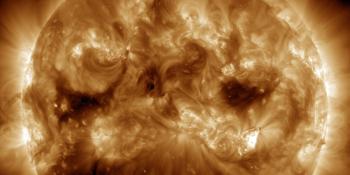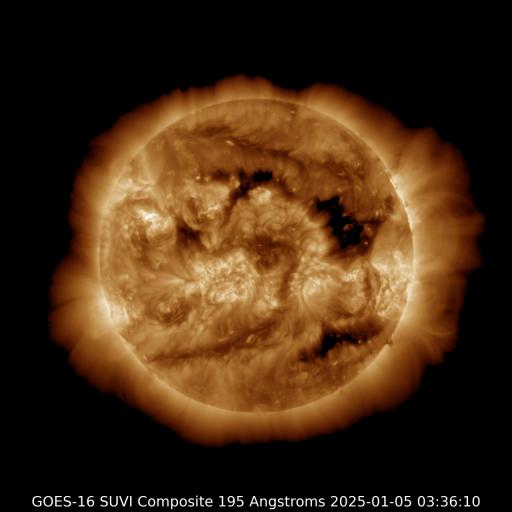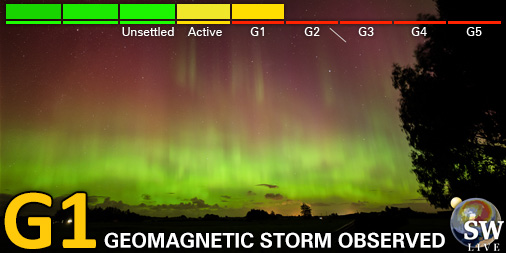Viewing archive of Tuesday, 17 January 2017
Daily bulletin on solar and geomagnetic activity from the SIDC
Issued: 2017 Jan 17 1327 UTC
SIDC Forecast
Solar flares
Quiet conditions (<50% probability of C-class flares)
Geomagnetism
Quiet (A<20 and K<4)
Solar protons
Quiet
| 10cm flux | Ap | |
|---|---|---|
| 17 Jan 2017 | 078 | 004 |
| 18 Jan 2017 | 079 | 005 |
| 19 Jan 2017 | 078 | 017 |
Bulletin
There are two numbered sunspot group presently visible on the solar disc, Catania sunspot group 77 and 78 (NOAA ARs 2625 and 2626), and both of them have alpha configuration of the photospheric magnetic field. Accordingly, solar activity is low, with no C-class and only one B-class flares reported during last 24 hours. We expect solar activity to remain on the same low level. The faint and slow partial halo CME was first seen in the SOHO LASCO C2 field of view at about 21:30 UT (straight after the data gap) on January 16. The bulk of the CME mass was directed northward from the Sun-Earth line, and this stealth-like CME with presently unclear solar counterpart, will most probably not arrive to the Earth. More will be reported when additional data become available.
The Earth is still inside the slow solar wind with the speed, similar as reported yesterday, of about 320 km/s. The interplanetary magnetic field magnitude is about 6 nT. The fast solar wind, associated with the elongated equatorial coronal hole extended towards the south, which has crossed central meridian yesterday, might arrive at the Earth late on January 18 or in the morning of January 19. The geomagnetic conditions are presently quiet and we expect them to stay so in the coming hours. The expected arrival of the fast solar wind might induced disturbed geomagnetic conditions (we expect up to K=4).
Today's estimated international sunspot number (ISN): 031, based on 17 stations.Solar indices for 16 Jan 2017
| Wolf number Catania | 025 |
| 10cm solar flux | 078 |
| AK Chambon La Forêt | 005 |
| AK Wingst | /// |
| Estimated Ap | 002 |
| Estimated international sunspot number | 024 - Based on 17 stations |
Noticeable events summary
| Day | Begin | Max | End | Loc | Strength | OP | 10cm | Catania/NOAA | Radio burst types | |
|---|---|---|---|---|---|---|---|---|---|---|
| None | ||||||||||
Provided by the Solar Influences Data analysis Center© - SIDC - Processed by SpaceWeatherLive
All times in UTC
Latest news
Latest forum messages
Support SpaceWeatherLive.com!
A lot of people come to SpaceWeatherLive to follow the Sun's activity or if there is aurora to be seen, but with more traffic comes higher server costs. Consider a donation if you enjoy SpaceWeatherLive so we can keep the website online!

Latest alerts
00:55 UTC - Coronal hole
A southern hemisphere coronal hole is facing Earth. Enhanced solar wind could arrive in ~3 days
Monday, 7 April 2025
20:45 UTC - Geomagnetic activity
Active geomagnetic conditions (Kp4) Threshold Reached: 20:39 UTC
17:33 UTC - Hemispheric Power Index
The OVATION model predicts the Hemispheric Power Index to reach 51GW at 18:18 UTC
Sunday, 6 April 2025
02:00 UTC - Geomagnetic activity
Minor G1 geomagnetic storm (Kp5) Threshold Reached: 01:50 UTC
Space weather facts
| Last X-flare | 2025/03/28 | X1.1 |
| Last M-flare | 2025/04/05 | M1.0 |
| Last geomagnetic storm | 2025/04/06 | Kp5 (G1) |
| Spotless days | |
|---|---|
| Last spotless day | 2022/06/08 |
| Monthly mean Sunspot Number | |
|---|---|
| March 2025 | 134.2 -20.4 |
| April 2025 | 148.7 +14.5 |
| Last 30 days | 134.1 -5.6 |





